国际地质灾害与减灾协会(ICGdR)召开
"面向地震预测的跨断层测量"国际对比研究计划(ICGdR-ICRP-1)专家组第一次会议
发布时间:2022年08月01日
浏览数:7637
北京时间2022年7月25日晚间,国际地质灾害与减灾协会(ICGdR)线上召开了"面向地震预测的跨断层测量"国际对比研究计划专家组第一次会议。专家组主任何满潮院士、专家组副主任汪发武院士、专家组秘书长陶志刚教授、美国专家Antonio Bobet教授、Ahmad Ghassemi教授、印度尼西亚专家Teuku Faisal Fathani 教授、尼泊尔专家Ranjan Kumar Dahal教授、俄罗斯专家Alexander Strom 博士、日本专家Omer Aydan教授、韩国专家Seokwon Jeon教授、印度专家Malay Mukul教授及中国专家徐锡伟研究员等来自全球8个国家的共21位专家代表参会。
会议由ICGdR主席汪发武院士主持。他首先介绍了ICGdR的建立背景及开展的主要活动,然后介绍了"面向地震预测的跨断层测量"国际对比研究计划(ICGdR-ICRP-1)的立项经过、专家组的责任和义务,最后介绍了专家组组成和与会的专家组成员。
作为专家组主任,何满潮院士提出了"Evaluation Policy of ICGdR-ICRP-1"的方案,对该国际对比研究计划的运行机制及评估过程进行了阐述。方案得到专家组成员的一致赞同。
随后,基于该方案,专家组对来自5个国家的项目申请进行了审议。
何满潮,汪发武,陶志刚 (中国矿业大学(北京),同济大学):: Application of ICRP of Cross Fault Measurement for Earthquake Prediction from China;
Antonio Bobet(美国普渡大学):Detection of Fault Slip through Active Seismic Monitoring
Ahmad Ghassemi教授(美国俄克拉荷马大学):Injection Related Seismicity
Teuku Faisal Fathani教授(印度尼西亚加札马达大学):Earthquake Hazard and Risk Reduction in Indonesia
Ranjan Kumar Dahal教授(尼泊尔特里布文大学):Active Faults and Relevant Tectonic Features in the Nepal Himalaya
Alexander Strom博士(俄罗斯地球动力学研究所):Active Faults in Russia Possible for Cross Fault Measurements
专家组对以上提案进行了认真审议,原则上通过了这六项申请,同意接受成为ICGdR-ICRP-1的第一批项目,并对个别项目提出了补充材料的要求。专家组一致认为,通过这次审查和交流,进一步增进了各国专家对于地震预测这一科学问题的共识,并建议早日形成项目申请书模板,以方便后续项目的申请。
最后,ICGdR主席汪发武作总结发言,认为专家组第一次会议的成功召开,为该国际对比研究计划的后续工作开展奠定了良好的基础。并对项目申请团队积极参与和支持"面向地震预测的跨断层测量"国际对比研究计划(ICGdR-ICRP-1)表示欢迎,对专家组卓有成效的工作表示感谢。 他表示ICGdR将大力支持本次会议形成的决议,继续推动该国际对比研究计划的具体实施。
作为专家组主任,何满潮院士提出了"Evaluation Policy of ICGdR-ICRP-1"的方案,对该国际对比研究计划的运行机制及评估过程进行了阐述。方案得到专家组成员的一致赞同。
随后,基于该方案,专家组对来自5个国家的项目申请进行了审议。
何满潮,汪发武,陶志刚 (中国矿业大学(北京),同济大学):: Application of ICRP of Cross Fault Measurement for Earthquake Prediction from China;
Antonio Bobet(美国普渡大学):Detection of Fault Slip through Active Seismic Monitoring
Ahmad Ghassemi教授(美国俄克拉荷马大学):Injection Related Seismicity
Teuku Faisal Fathani教授(印度尼西亚加札马达大学):Earthquake Hazard and Risk Reduction in Indonesia
Ranjan Kumar Dahal教授(尼泊尔特里布文大学):Active Faults and Relevant Tectonic Features in the Nepal Himalaya
Alexander Strom博士(俄罗斯地球动力学研究所):Active Faults in Russia Possible for Cross Fault Measurements
专家组对以上提案进行了认真审议,原则上通过了这六项申请,同意接受成为ICGdR-ICRP-1的第一批项目,并对个别项目提出了补充材料的要求。专家组一致认为,通过这次审查和交流,进一步增进了各国专家对于地震预测这一科学问题的共识,并建议早日形成项目申请书模板,以方便后续项目的申请。
最后,ICGdR主席汪发武作总结发言,认为专家组第一次会议的成功召开,为该国际对比研究计划的后续工作开展奠定了良好的基础。并对项目申请团队积极参与和支持"面向地震预测的跨断层测量"国际对比研究计划(ICGdR-ICRP-1)表示欢迎,对专家组卓有成效的工作表示感谢。 他表示ICGdR将大力支持本次会议形成的决议,继续推动该国际对比研究计划的具体实施。
引自:http://www.icgdr.com/Home/Detail/72
On the evening of July 25, 2022 (CST), the International Consortium on Geo-disaster Reduction (ICGdR) held the first online expert group meeting of the International Correlation Research Program on "Cross-fault Measurement for Earthquake Prediction". 21 experts from 8 countries around the world attended the meeting, including Prof. Manchao He, the Director of the expert group; Prof. Fawu Wang, the ICGdR President and Deputy Director of the expert group; Professor Zhigang Tao, the secretary-general of the expert group; Prof. Antonio Bobet and Prof. Ahmad Ghassemi from USA, Professor Teuku Faisal Fathani and Dr. Fikri Faris from Indonesia; Professor Ranjan Kumar Dahal from Nepal; Dr. Alexander Strom from Russia; Prof. Omer Aydan from Japan; Prof. Seokwon Jeon from South Korea; Prof. Malay Mukul from India, and Prof. Xiwei Xu from China.
This meeting was presided over by Prof. Fawu Wang, the ICGdR President. He introduced the establishment background and main activities of the ICGdR at first, and then introduced the approval process of the International Correlation Research Program (ICGdR-ICRP-1) of "Cross-fault Measurement for Earthquake Prediction", as well as the responsibilities and obligations of the expert group, and finally introduced the composition and members of the expert group who were participating in this meeting.
As the Director of the expert group, Prof. Manchao He presented the "Evaluation Policy of ICGdR-ICRP-1", and explained the operation mechanism of the International Correlation Research Program and its evaluation process. The Policy was unanimously approved by all the members of the expert group.
Subsequently, based on the Evaluation Policy, the expert group evaluated the project applications from 6 countries.
Manchao He, Fawu Wang, Zhigang Tao (China University of Mining and Technology-Beijing, Tongji University): Application of ICRP of Cross Fault Measurement for Earthquake Prediction from China;
Antonio Bobet (Purdue University, USA): Detection of Fault Slip through Active Seismic Monitoring;
Ahmad Ghassemi (University of Oklahoma, USA): Injection Related Seismicity;
Teuku Faisal Fathani (Gadjah Mada University, Indonesia): Earthquake Hazard and Risk Reduction in Indonesia;
Ranjan Kumar Dahal (Tribhuvan University, Nepal): Active Faults and Relevant Tectonic Features in the Nepal Himalaya;
Alexander Strom (Institute of Geosphere Dynamics, Russia): Active Faults in Russia Possible for Cross Fault Measurements
The expert group had carefully reviewed the above proposals and approved the six applications, and agreed to accept these projects as the first batch of ICGdR-ICRP-1 projects, but supplementary materials were required for some projects. After the mutual exchanges in this meeting, the expert group agreed that the consensus among experts from various countries on the science of predicting earthquake has been increased, and suggested that a project application template should be formed as soon as possible to facilitate the application of subsequent projects.
At the end, Prof. Fawu Wang delivered concluding remarks: the successful convening of the first meeting has laid a good foundation for the follow-up work of the International Correlation Research Program. He expressed his welcome to the project application teams for their active participation and support, and his gratitude to the expert group members for their fruitful work. He finally stated that ICGdR will strongly support the resolutions approved at this meeting and promote the implementation of the International Correlation Research Program continually.
The International Consortium on Geo-disaster Reduction (ICGdR) held the first Expert Group meeting of the International Correlation Research Program (ICGdR-ICRP-1) on "Cross-fault Measurement for Earthquake Prediction"
On the evening of July 25, 2022 (CST), the International Consortium on Geo-disaster Reduction (ICGdR) held the first online expert group meeting of the International Correlation Research Program on "Cross-fault Measurement for Earthquake Prediction". 21 experts from 8 countries around the world attended the meeting, including Prof. Manchao He, the Director of the expert group; Prof. Fawu Wang, the ICGdR President and Deputy Director of the expert group; Professor Zhigang Tao, the secretary-general of the expert group; Prof. Antonio Bobet and Prof. Ahmad Ghassemi from USA, Professor Teuku Faisal Fathani and Dr. Fikri Faris from Indonesia; Professor Ranjan Kumar Dahal from Nepal; Dr. Alexander Strom from Russia; Prof. Omer Aydan from Japan; Prof. Seokwon Jeon from South Korea; Prof. Malay Mukul from India, and Prof. Xiwei Xu from China.
This meeting was presided over by Prof. Fawu Wang, the ICGdR President. He introduced the establishment background and main activities of the ICGdR at first, and then introduced the approval process of the International Correlation Research Program (ICGdR-ICRP-1) of "Cross-fault Measurement for Earthquake Prediction", as well as the responsibilities and obligations of the expert group, and finally introduced the composition and members of the expert group who were participating in this meeting.
As the Director of the expert group, Prof. Manchao He presented the "Evaluation Policy of ICGdR-ICRP-1", and explained the operation mechanism of the International Correlation Research Program and its evaluation process. The Policy was unanimously approved by all the members of the expert group.
Subsequently, based on the Evaluation Policy, the expert group evaluated the project applications from 6 countries.
Manchao He, Fawu Wang, Zhigang Tao (China University of Mining and Technology-Beijing, Tongji University): Application of ICRP of Cross Fault Measurement for Earthquake Prediction from China;
Antonio Bobet (Purdue University, USA): Detection of Fault Slip through Active Seismic Monitoring;
Ahmad Ghassemi (University of Oklahoma, USA): Injection Related Seismicity;
Teuku Faisal Fathani (Gadjah Mada University, Indonesia): Earthquake Hazard and Risk Reduction in Indonesia;
Ranjan Kumar Dahal (Tribhuvan University, Nepal): Active Faults and Relevant Tectonic Features in the Nepal Himalaya;
Alexander Strom (Institute of Geosphere Dynamics, Russia): Active Faults in Russia Possible for Cross Fault Measurements
The expert group had carefully reviewed the above proposals and approved the six applications, and agreed to accept these projects as the first batch of ICGdR-ICRP-1 projects, but supplementary materials were required for some projects. After the mutual exchanges in this meeting, the expert group agreed that the consensus among experts from various countries on the science of predicting earthquake has been increased, and suggested that a project application template should be formed as soon as possible to facilitate the application of subsequent projects.
At the end, Prof. Fawu Wang delivered concluding remarks: the successful convening of the first meeting has laid a good foundation for the follow-up work of the International Correlation Research Program. He expressed his welcome to the project application teams for their active participation and support, and his gratitude to the expert group members for their fruitful work. He finally stated that ICGdR will strongly support the resolutions approved at this meeting and promote the implementation of the International Correlation Research Program continually.


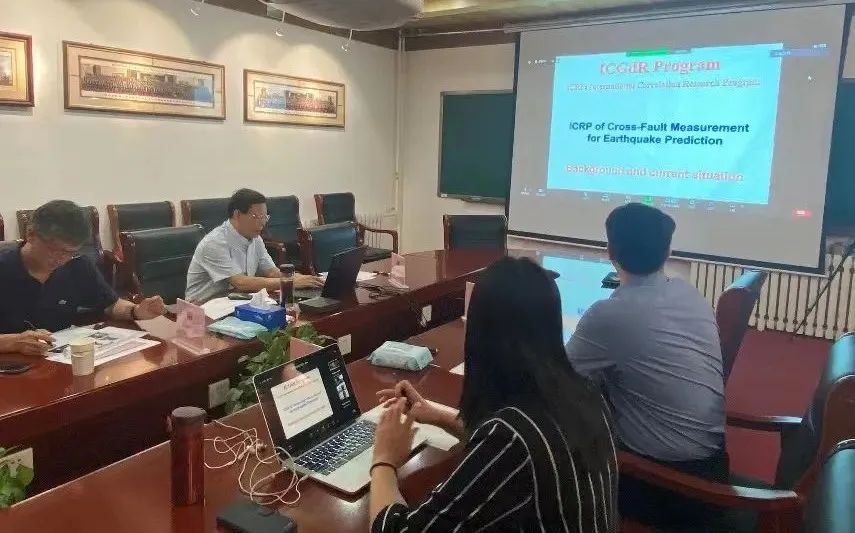
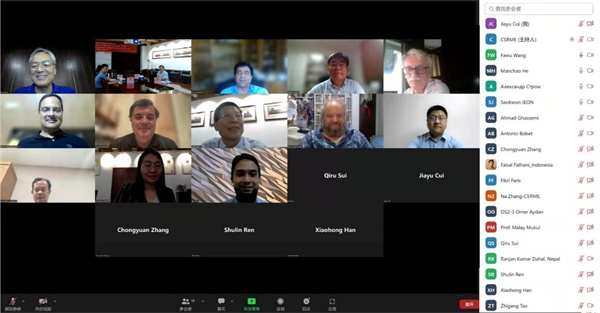
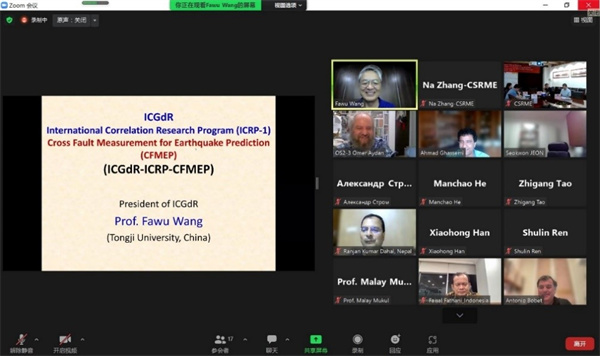
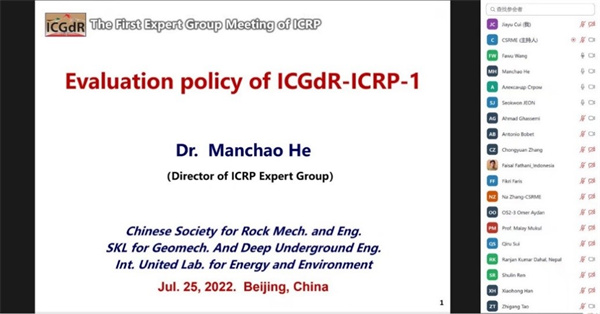
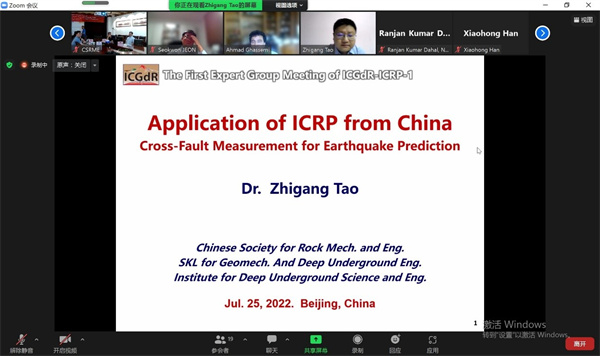
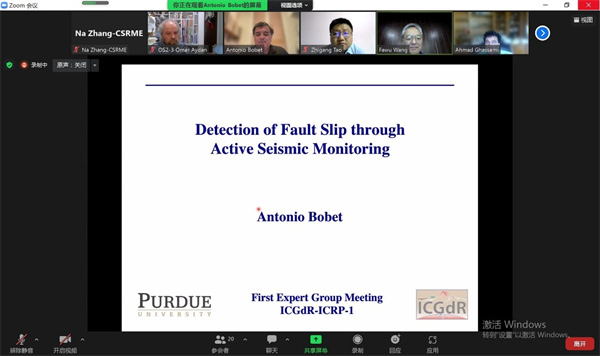
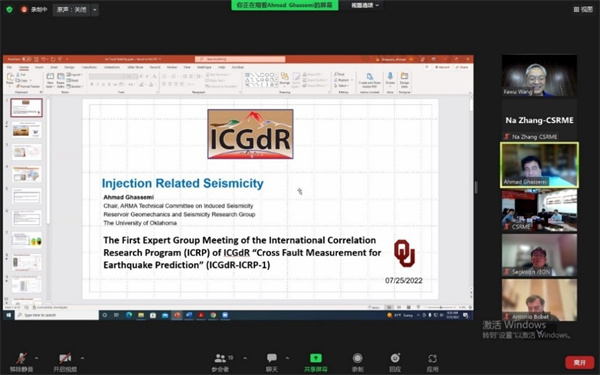
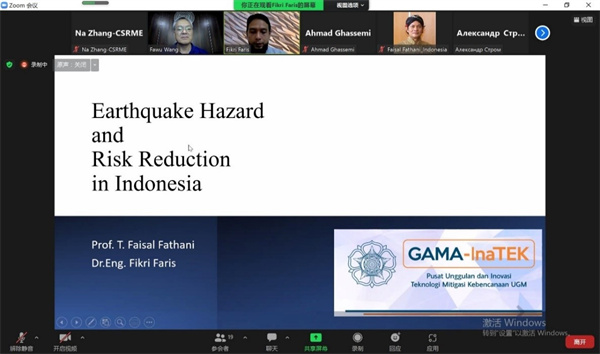
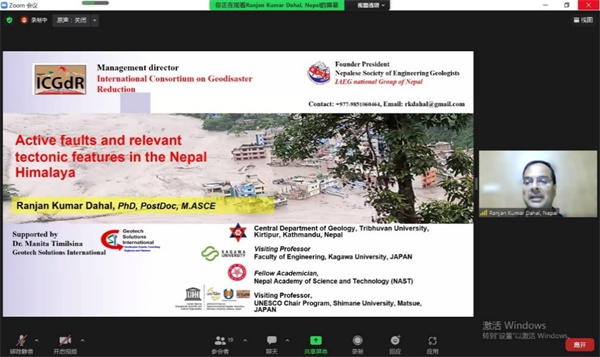
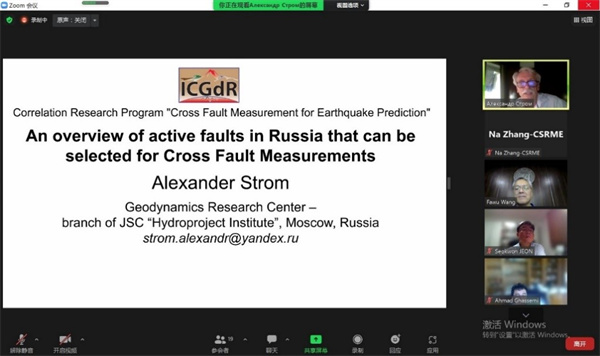







 中国岩石力学与工程学会微信订阅号
中国岩石力学与工程学会微信订阅号
 科普岩石力学与工程
科普岩石力学与工程